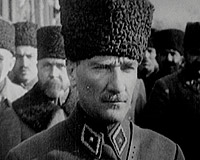Mustapha Kemal (1881-1938), called Atatürk ("the father of the Turks"), was the founder of the Republic of Turkey and its first President. Both in Turkey and abroad, however, his actions continue to stir debate. Was he a visionary statesman or an enlightened despot?
MUSTAPHA KEMAL ATATÜRK tells the story of this historic figure with archival footage, newsreels and photos, and discussions with Turkish and Western historians, sociologists and biographers. The film traces his early secular education and his political rise as an army officer, from the birth of the "Young Turks" movement in 1908, through WWI, the Turkish War of Independence, the dethroning of the Sultan and elimination of the Caliphate, and the establishment of the republic in 1923.
Much of the film's debate focuses on Kemal's authoritarian rule, when he abolished the national parliament, outlawed opposition parties and labor unions, and forced through legislation that led to sweeping political, economic and social reforms.

MUSTAPHA KEMAL ATATÜRK makes clear that any consideration of Atatürk's historic role must recognize that, while he played a major role in modernizing the nation-including the establishment of a Civil Code to replace religious tribunals, decreeing equality between the sexes, abolishing polygamy and granting women the right to vote-his "democracy" was founded upon a single party dictatorship whose cult-of-personality leader engendered as much fear as respect.
The rapid transformation of Turkey into the first secular Muslim republic, attempting to blend Western and Eastern influences, upset much of the country's population and laid the basis for tensions still at the center of Turkey's social and political life today..
The recent rise of Political Islam has meant increasing challenges to the legacy of Kemalism. Turkey's democratic government has an increasingly Islamic character, while the military staunchly defends the secular basis of the regime. In its contemporary political tensions-Muslim vs. secular, religious vs. political-Turkey more than ever reflects not only its unique geopolitical position on the world map, but also the mixed legacy of the nation's national hero.
"Despite varying views, the documentary makes clear that [Mustapha's] quick secularization and attempt to supplant Eastern culture with Western culture…have not been as penetrating as is often claimed."—Al Jadid
"Intricate and meticulously assembled… simply astounding… This outstanding work is highly recommended to those who want an advanced and comprehensive record of Turkey in the early 20th century."-Michael J. Coffta, Educational Media Reviews Online
